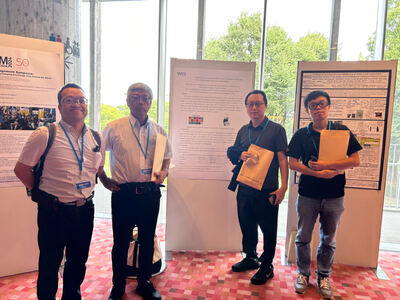NEWS
- Home
- Japan's nuclear wastewater discharge, Tsinghua University's radionuclide research team, "treating nuclear wastes with wastes" is in the spotlight.

Japan's nuclear wastewater discharge, Tsinghua University's radionuclide research team, "treating nuclear wastes with wastes" is in the spotlight.
[People's Daily Online: Zhiyi Zhuge reported] The Seventh Fukushima Power Plant Decommissioning Academic Conference 2023 was held on August 27-28, and Dr. Chuanbin Li, a member of the Academic Research Team on Radioactive Nuclear Species Characterization at Tsinghua University, went to participate in the event. In addition to the research results of the "Waste to Rule Out Nuclear Waste" proposed in the symposium, which have been attracting attention, Chuanbin Li and his colleagues were also invited into the Fukushima Power Plant to visit the plant on 29th, which is the first time that a third party is invited into the site of the Fukushima Power Plant for visiting the site of the nuclear waste after the commencement of the discharge of the nuclear wastewater in Japan.
Dr. Li Chuanbin said that the visit was mainly to two areas, in addition to the nuclear reactors 1 to 4, which are still decontaminating and dismantling parts of the units, and also to check the operation of the ALPS (Advanced Labeling Processing System) treatment facility, which is currently discharging tritium water. Through the on-site personnel, the current tritium water discharge and monitoring situation was explained, and at the same time, the progress of the current decontamination work at the plant was also discussed with key personnel from Tokyo Electric Power Company, and the discharge was also overseen by personnel from the International Atomic Energy Agency (IAEA).
Dr. Li Chuanbin said that the "2025 Non-Nuclear Home" policy is the main national policy at present, however, what to do with the nuclear waste generated from the past 40 years of operation is still the main controversy at present. Over the years, Tsinghua University's Nuclear Species Characterization Research Group has established long-term cross-field cooperation with different professional academic research teams in China, regularly inviting domestic and foreign professional researchers and organizing various academic discussion meetings to jointly study the long-term migration behavior of different radioactive nuclear species in different environments.
Dr. Li Chuanbin team members continue to participate in international environmental radiochemistry seminars, and eventually found that the use of various types of industrial and agricultural, forestry, fisheries and animal husbandry waste materials, can be used to solve the radiation hazards of radioactive species in the environment, has begun to use discarded diapers and natural environmental protection zeolite as raw materials, through the low-carbon innovative technology surface treatment technology, successfully applied to purify nuclear wastewater and environmental remediation and restoration, and apply for patents in various countries for follow-up planning of new companies. And apply for patents in various countries to continue planning for the new company, "Waste to cure nuclear waste" in the Fukushima power plant decommissioning academic research conference, by Japan's TEPCO concern and caused by the research team from various countries to discuss enthusiastically, the results will be able to solve the problem of nuclear waste after the decommissioning of the power plant for Taiwan, and in the future can be promoted to the rest of the world.
In addition, Tsinghua University's Radioactive Nuclear Species Characterization Research Team and Japan's Institute for Sustainable Environment (ISE) have recently completed a Memorandum of Understanding (MOU) to collaborate on the research and development of low-carbon, environmentally friendly, recycled materials for the elimination and reduction of radiation and toxic contamination in the soil, using third-party parallel verification as a basis for consensus, and strengthening radiation safety testing techniques and long-term risk assessment of agricultural and fishery products with the aim of achieving the Global Environmental Sustainability Goals (SDGs).
Meanwhile, starting from August 2023, the Taiwan Radioactive Nuclear Species Characterization Research Team and Yi Chun Environmental Protection Co. have initiated the first phase of an industry-academia cooperation project, which is expected to use the diaper material after recycling and decomposition of waste from Yi Chun to carry out a long-term research project on remediation of the contaminated site near Fukushima, Japan, and radiation monitoring. Dr. Chuan-Pin Lee emphasized that "nuclear waste treatment with waste" is currently the lowest carbon environmental protection and effective solution, which will provide Taiwan with future nuclear power plant decommissioning after the nuclear waste treatment and experience reference.

